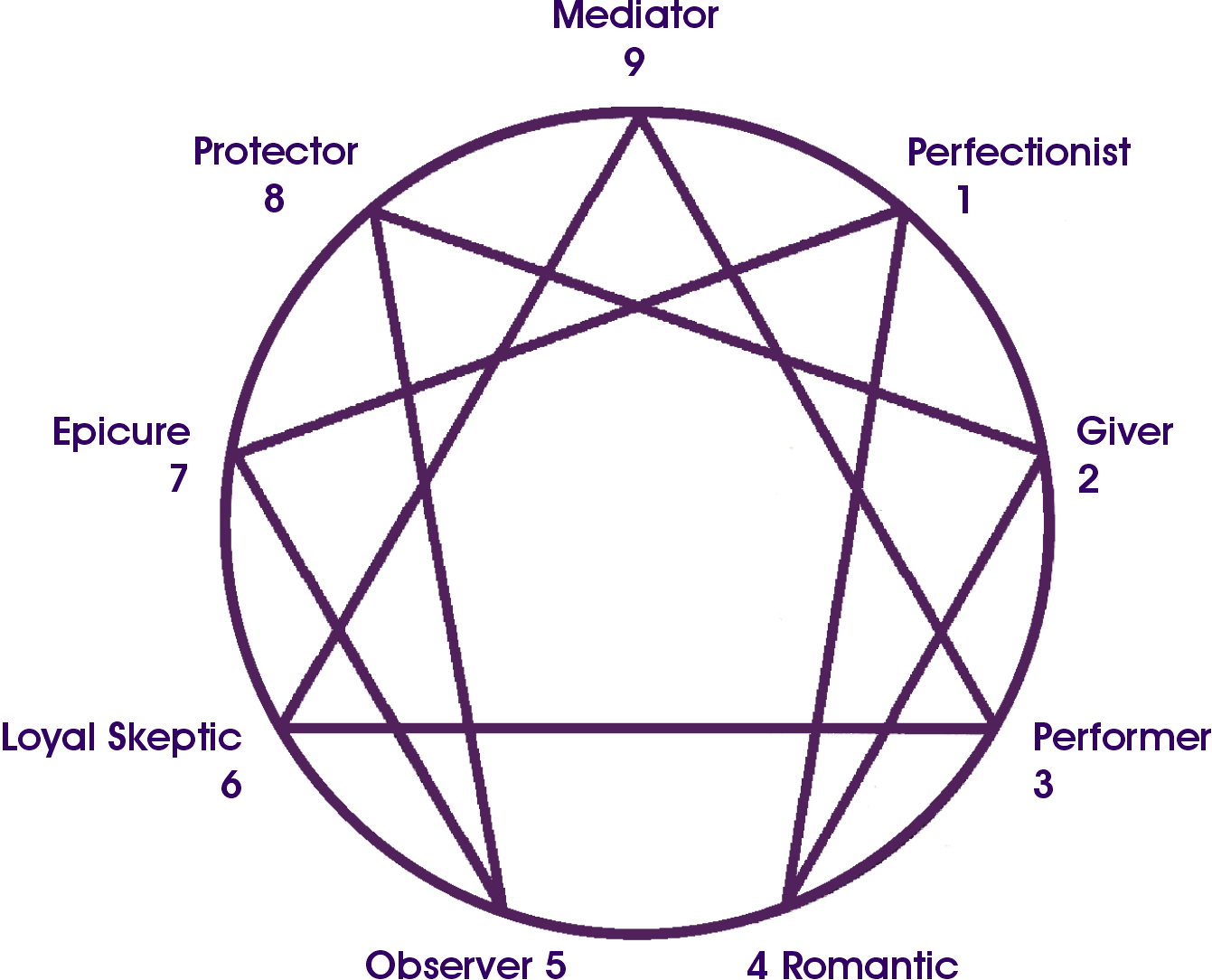First of all, what is Enneagram? Enneagram is an ancient personality model, updated by psychologists in the human potential movement. It describes how to understand our personality types, how to work with them and how improve the way we connect with others and operate in the world.
This is most helpful in relationships. Let’s see how…
Enneagram figure
You can see that there are 9 types, and each type connects with other types.
Nine types
Each number has its “characteristic roles”. They also are connected by the lines of the enneagram figure to other types and these indicate what influences a person in more adverse or relaxed circumstances. For example, someone classed as a One type, may begin to think, feel and act more like a Four type when stressed, or more like a Seven type when relaxed.
Wings
Many people are also influenced by the two adjacent types as indicated on the enneagram figure. These two types are often called “wings”. A person of the Three personality type, for example, is understood to have points Two and Four as their wing types. A person may be understood to have a core type and one or two wing types that influence them but do not change their core type.
Lets look at the Types.
Type 1: The Reformer- Their basic need is to feel that all is in order.
Reformers strive for perfection and to get things ‘right’ by trying to be rational, idealistic, principled, purposeful, and self-controlled.
When relaxed they are great at working to make things happen well, and they can be playful.
When stressed, feel that they are bad or wrong, or that things around them are not as they should be, they can become hypercritical, short-tempered, irritable and angry and controlling.
If Your Partner is a Reformer
- If your partner is Type 1, perhaps they are stressed and therefore feeling out of control. Instead of ending up in a shouting match, you will probably see that they are overwhelmed and can help by showing them what is working in their world, and how to divide tasks into little chunks so things feel right and manageable for them.
- Pointing out what is working for them will help them re-center and feel more connected and present.
- Remind them, when they are open to hear it, that Fundamental nature of everything isinherently perfect and encourage them to find perfection in the imperfection of life.
Type 2: The Helper -Their basic need is to be loved.
- In order to get love, they try to be very loving themselves, or to buy other people’s love by over-giving.
- When relaxed they are genuinely caring, friendly, demonstrative, hospitable and generous.
- When stressed they can feel people-pleasing, ingratiating, possessive, clingy, hurt and resentful.
- In a Relationship:
- If you experience them as needy or passive-aggressive, or guilt tripping, then you can remind them that they are great just the way they are and that they don’t need reassurance from the outside in order to be the lovable selves they intrinsically are. You can do this in a loving way….or if you don’t, notice if you are feeling stressed and what you might need in the moment!
Type 3: The Achiever – Their basic need is to feel valuable.
- They strive to be seen as valuable and in order to display their worth they tend to be pragmatic, driven, and success-oriented.
- When relaxed they are highly adaptive, often excelling in what they do
- When stressed they are image-conscious, vain, approval seeking and push themselves to always “be the best”.
- In a Relationship:
- Because they often find it difficult to perceive what they truly feel or what is true for them, you can remind them to take time to tap into what they genuinely feel so that don’t just overlay the attitudes they think are appropriate for the situation.
- Remind them that being great has more to do with Being rather than Doing…..with who they are when they are vulnerable and emotionally available.
Type 4: The Individualist –Their basic need is to express their uniqueness.
- They prove their significance to themselves and others through their creativity, artistry, expressive imagination and are often very talented.
- When stressed they can become overly sensitive, overly, dramatic, self-absorbed, withdrawn, fantasizing, melancholic, temperamental and feel that no-one will ever understand them.
- Enneagram fours take their emotions seriously and often feel that if they feel something, it is real.
- In a Relationship:
- Firstly it is helpful to acknowledge that you know the issue feels real to them.
- Then gently remind them that you too have feelings about the situation that may feel different from theirs.
- Take the time to discuss what their feelings, and yours, are. This is important because otherwise they will simply feel dismissed and won’t be able to hear the other side of the situation.
- Only then can you gently remind them to look at the situation from a different perspective, trying to witness their emotions instead of buying in to them.
Type 5: The Investigator – Their basic need is to be masterful.
- Fives have felt grown up feeling like they needed to have their act together, and in order to guard against their fears of helplessness, incapability, or incompetence they become intensely cerebral.
- Their strengths are that they are perceptive, innovative, often able to understand the patterns of things, and good problem solvers.
- When they are stressed they can be secretive, isolated, stingy, and resort to concepts instead of risking direct experience. Their desire to be competent can deteriorate into useless specialization.
- They Manipulate others by trying to make them feel helpless, incompetent, stupid, and incapable and being preoccupied and detaching emotionally.
- In a Relationship:
- Because Fives can become hyperactive and scattered a partner can gently remind them to focus on the issue at hand.
- Also, because they have a tendency when stressed of withdrawing from reality into concepts and mental worlds, and indecision you can remind them to connect with their feelings, and their deeper inner selves.
- By listening to them as they describe their inner experience you validate their self-worth and they will feel less alone and separate.
Type 6: The Loyalist – Their basic need is to feel like they are being supported.
- They are great joiners and if they don’t find a group to join they will often help to create one that they feel will be supportive.
- Because they are security-oriented, they are engaging, loyal and responsible, and will be very committed to organizations that they feel are supportive of them..
- When they are stressed and they feel a lack of support, they can become anxious, fretful, cowardly and suspicious.
- In a Relationship:
- Remind them that you care about their well-being even though you might encounter differences. Being reminded that they are part of a loving relationship will help them to become more relaxed and optimistic.
- Because they will become dependent on something outside themselves for guidance you can remind them to find a way to access their inner wisdom perhaps through journaling contemplation or meditation.
Type 7: The Enthusiast – Their basic need is to feel satisfied and content.
- Sevens love to be busy, and spontaneous. They are all about adventure, and they hate to feel trapped.
- When life feels good to them, they are versatile, fun loving, creative, and inspiring.
- But when they are stressed, they can be distractible, flakey, overextended, scattered and can spend an inordinate amount of time thinking the grass is greener elsewhere.
- In a Relationship:
- Sevens feel trapped when things are not going smoothly. They tend to feel that if life is not flowing well, something is wrong and they can get the feeling that something better is available somewhere else.
- Sevens can really grow when they slow down and stick things out so although they might crave the new and exciting, encourage them to find beauty in the moment and not rush to change things.
- Because they are naturally optimistic and enjoy a challenge, if they feel that you really care, their tendency to want to make things happen will allow them to work to sort things out.
Type 8: The Challenger- Their basic need is to feel protected.
- Eights are the typical leaders of the pack, and like to feel completely self-sufficient. They have a fear of being harmed, controlled or violated by others.
- When everything in life is running smoothly for them, they are often powerful, self-confident, and decisive,
- When they are stressed they can become willful, dominating, and confrontational, vengeful, lustful and objectify others.
- In a Relationship:
- When stressed self-confident eights become secretive and fearful, and can become overbearing and controlling.
- Because they feel they need to fight to make things happen, they can be hard to deal with.
- Remind them that they are loved, and that you really care about them. This will enable them to soften.
- Because they tend to push away feelings of weakness or vulnerability and fear “soft” emotions such as sadness, weakness, indecisiveness, neediness or deficiency, you need to get across to them the notion that you appreciate them when they can show the side of themselves that does not always feel strong. Then they will be able to relax and show you the truly caring side of their nature.
Type 9: The Peacemaker – Their basic need is for harmony and peace of mind.
- Nine like everything around them to be in harmony and will often sacrifice their own needs to make this happen avoiding both conflict and self-assertion.
- When Nine’s are relaxed, they are easygoing, self-effacing receptive, reassuring, and agreeable and prone to daydreaming.
- When they are stressed they can become complacent, apathetic, lazy, depressed and at worst can feel separation and fragmentation.
- In a Relationship:
- When stressed nines become anxious, worried, and may appear to be lazy and stubborn.
- Because they can easily see other’s point-of-view, they might become outwardly accommodating others for peace at all costs.
- They are however innately solid, stable, dependable and kind and a gentle reminder to them to connect with their inner selves in order to access their own Truth, will soon find them back to their beneficent and unconditionally loving selves.
So when you or your partner is acting out, ask yourself whether this might just be because that’s how your Enneagram type reacts to stress. Once you can gently acknowledge the stress, then you can address the real issue and not the symptoms. Instead of just reacting to the tone or words said, you can remember that to reduce the stress they or you might be feeling is the first step to better communication.
Share these insights with your partner and you will notice how much it really helps!


